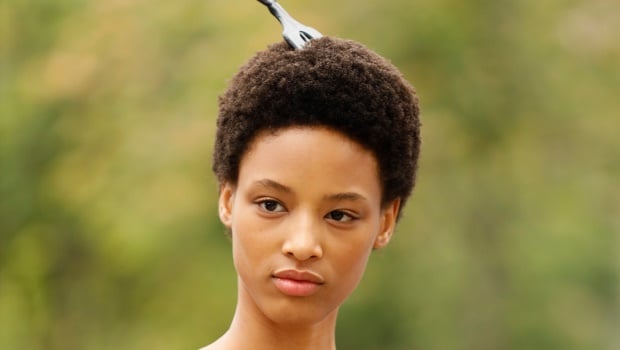
- My mother has straight hair and was taught that straight hair is always better.
- This is tied to SA’s painful past and present struggles with race and practices like the pencil test.
- When I started my natural hair journey three years ago, I thought the hardest part would be learning how to manage my hair.
- Turns out it's actually been learning how to manage my mom’s reaction towards my hair.
I was three years old the first time she put relaxer on my hair. And that was just the beginning.
There would be at least two more decades of relaxer burns, hair breakage and various other kinds of chemical treatments to make my hair straighter (read: better).
READ MORE: My relationship with my natural hair is about as complicated as my relationship with my ex
When I was 24, a hairdresser told me I shouldn’t relax my hair anymore. I was sceptical at first; this was the only thing I knew, but then I decided to jump right in and transition.
I've had massive fights with my mother about my hair. She once told me that only a black man would love me with my hair like this and that I’m not allowed to bring 'him' home.
The blatant racism was difficult to fathom; I reeled from it. Now, a couple of years later, I have a white boyfriend who loves my curls, but it still hasn't stopped my mother from going behind my back to try and convince him to persuade me to straighten my hair again.
Even though my hair is healthy and thick, the fact that it’s curly and 'kroes' just doesn’t sit well with her.
READ MORE: Bantu Knots - Is this the most racially-loaded hairstyle of our time?
While this really upsets me, I also realise that my mom still needs to unlearn that internalised racism and prejudice she was taught for many years.
Gadija Roshan, a clinical psychologist in Cape Town, says that hair is a big part of our identity. “It is one of the many political or socio-economic nuances that exist for so many of us, especially for non-whites, believing… that blonde and straight was the best thing since sliced bread and that perhaps consciously and unconsciously translated to less than or not good enough,” she says.
She says that this feeling of not being good enough can contribute to a negative self-image and while mothers who do judge their daughter’s hair may not do so purposefully, they are perhaps also sitting with feelings of not being good enough which is a narrative that is common in an oppressive system in South Africa.
I also spoke to Sol Maria Fernandez Knight who is a researcher at UNISA’s Institute for Social and Health Sciences and specialises in issues of gender, identity, social justice and inequality.
She also says that women of colour have been taught negative things about our natural appearance.
“Historically, society has placed negative valuations on our features, from our skin colour to our hair, which is made evident in the media’s lack of inclusivity for natural hair textures, and institutional discrimination. Such valuations have maintained black women within a cycle of inferiority that trickles down to their lived realities and how they are viewed in their communities,” says Maria.
She also says that the natural hair movement has helped many women of colour to let go of the myths that their hair needed to be “rectified” or was unmanageable.
Now while my mother many not think she's blatantly racist, her reaction towards my hair is. That doesn’t make her a terrible person, but it does mean that she needs to unlearn a lot of biases and let go of a lot of negative perceptions. This is internalised racism.
According to Donna K Bivens, who wrote on the subject for racialequitytools.org, people of colour are victimised by racism and therefore often internalise it.
“That is, we develop ideas, beliefs, actions and behaviours that support or collude with racism. This internalised racism has its own systemic reality and its own negative consequences in the lives and communities of people of colour.”
My mother’s issue with my hair is just one example of this within the broader community of people in this country.
And it is still an issue that needs to be addressed and dealt with in the best way possible.
I hope someday she accepts me for who I am and the hair I have, but it is also not up to me to teach her differently.
This is an issue she needs to face on her own. But for now, I will keep wearing my curly hair exactly the way I want to and hope that works.
Gadija Roshan is a clinical psychologist in Cape Town, to contact her, visit her Find Help page here.
Get in touch with us via email on chatback@w24.co.za.
Follow us on social media: Facebook, Twitter, Instagram
Sign up to W24’s newsletters so you don't miss out on any of our stories and giveaways.




 Publications
Publications
 Partners
Partners










